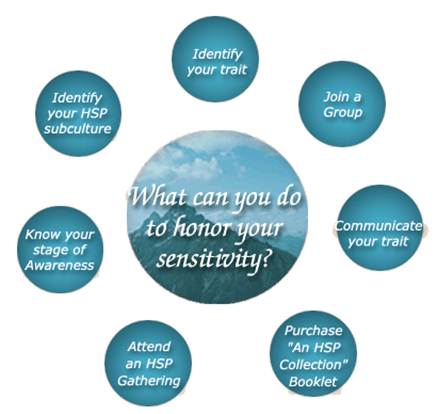If you’re overwhelmed by your emotions, you
may be a ‘highly sensitive person’. Taking simple steps to look after yourself
will make life easier.
Are you sometimes told to ‘lighten up’?
Maybe you wonder why you can’t laugh things off and tough your way through as
many of your friends can. Or perhaps you’re physically sensitive, and dislike
loud noises and bright lights? If this sounds familiar, you may have a trait
known as ‘sensory processing sensitivity’. Dr. Elaine Aron, a psychologist and
author of The Highly Sensitive person (Thorsons, $15.49), refers to those who
possess the trait as ‘highly sensitive’. Take our test to see if that’s you.

Are
you super sensitive?
Highly Sensitive?
Tick the boxes that apply to you.
·
I’m easily overwhelmed by strong sensory input.
·
I seem to be aware of subtleties in my
environment.
·
Other people’s moods affect me.
·
I need to withdraw during busy days.
·
I’m easily overwhelmed by things like bright
lights, strong smells, coarse fabrics or loud sirens.
·
I have a rich, complex inner life.
·
I’m uncomfortable with loud noise.
·
I’m deeply moved by the arts or music.
·
I’m conscientious and try hard to avoid making
mistakes.
·
I make a point to avoid violent movies and TV
shows.
·
Being very hungry creates a strong reaction in
me, and disrupts my concentration or mood.
·
When I was a child, my parents or teachers saw
me as sensitive or shy.
Your score
Nine or more: You’re highly sensitive.
Six to nine: You may still be highly sensitive, particularly if certain
statements rang true.
Five or fewer: You may have sensitive traits that show up more in certain
situations.
What it means for you?
‘Fifteen to 20 per cent of the population
is a highly sensitive person (HSP). It’s a survival strategy – being observant
before acting,’ says Aron. It’s not a flaw; your brain just works in a
different way. But you may be labeled ‘neurotic’, which can lead to low
self-esteem.

Fifteen
to 20 per cent of the population is a highly sensitive person (HSP)
Loving your sensitivity
But it doesn’t have to be this way. Your
sensitive has many benefits once you learn how to nurture it. First, start to
value the fact that you’re highly empathic to others, which makes you a
wonderful friend. You’re also skilled at noticing the finer details when
everyone else is focused on the bigger picture, so you’re an important team
player at work. You’re very attuned to your body and its needs, so you know how
to look after your health, and you can appreciate art and music in a way others
often miss. And finally, you are also highly sensual and, as a result, make a
fantastic lover.
TLC for the highly sensitive person
Take a deep breath: You may fret over things that aren’t that important, which can mean
others find you difficult at times. Aron explains HSPs have higher levels of
the stress hormone cortisol, which can mean you’re over-perceptive to personal
threat. An upset involving a friend or partner can seem a bigger deal than it
really is.
Check your priorities: You may be ‘co-dependent’ and put others’ needs before your own.
‘There’s a difference between being selfless as a choice and selfless because
it’s the only way you feel loved,’ says Aron. A wise person might look at you
and say, ‘You’re demeaning yourself for ungrateful people’.
Nourish yourself: Yoga, meditation, walking outdoors and good food are all important.
Be careful with anything over-stimulating, from coffee to too much
cardiovascular exercise. ‘Some HSPs reach for alcohol, drugs or overspending,’
says Aron. ‘Channel that urge in a different way. Be creative – with you
sensitivity, you can produce real beauty.’
Be calm:
Keep indoor lighting soft and temperature moderate. Wear sunglasses on bright
days, and carry earplugs to wear on public transport. At works, the glare of
computer screens can be balanced by taking regular breaks from your desk.